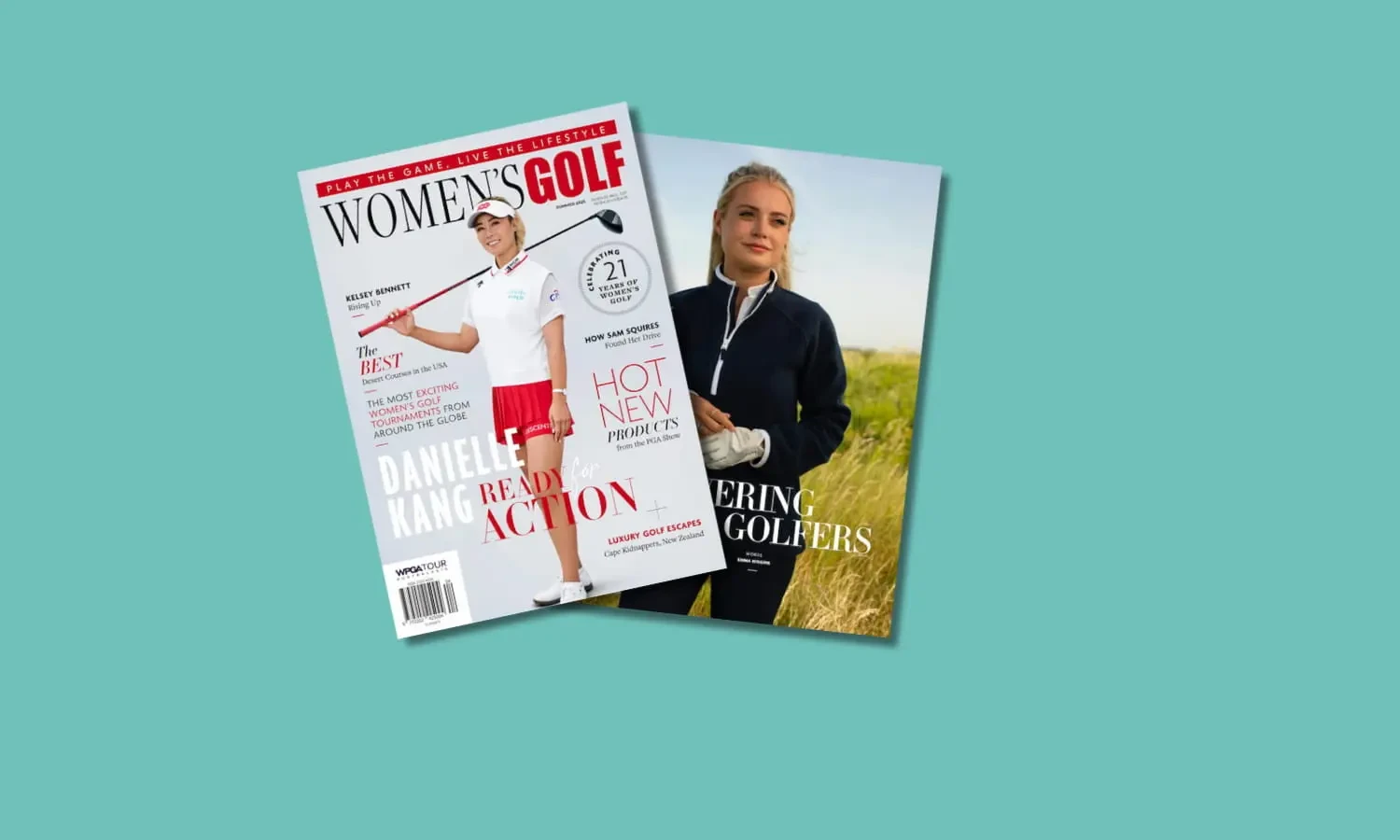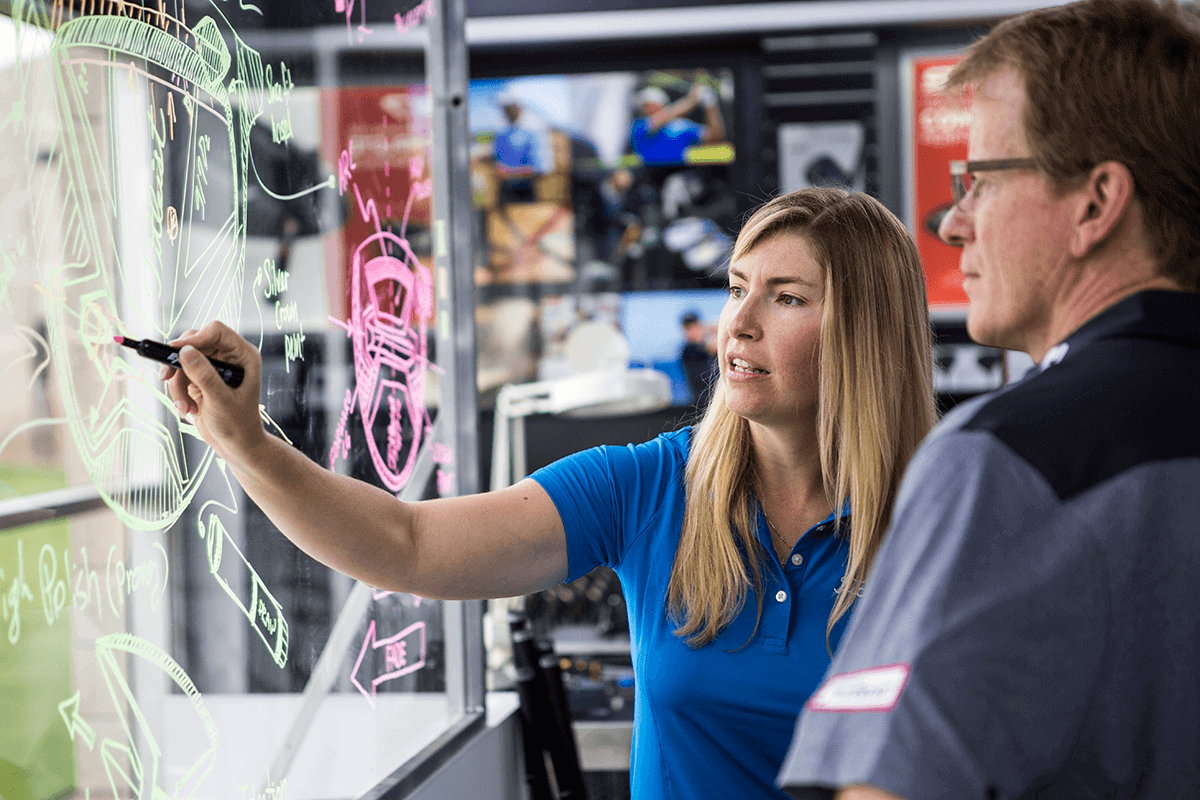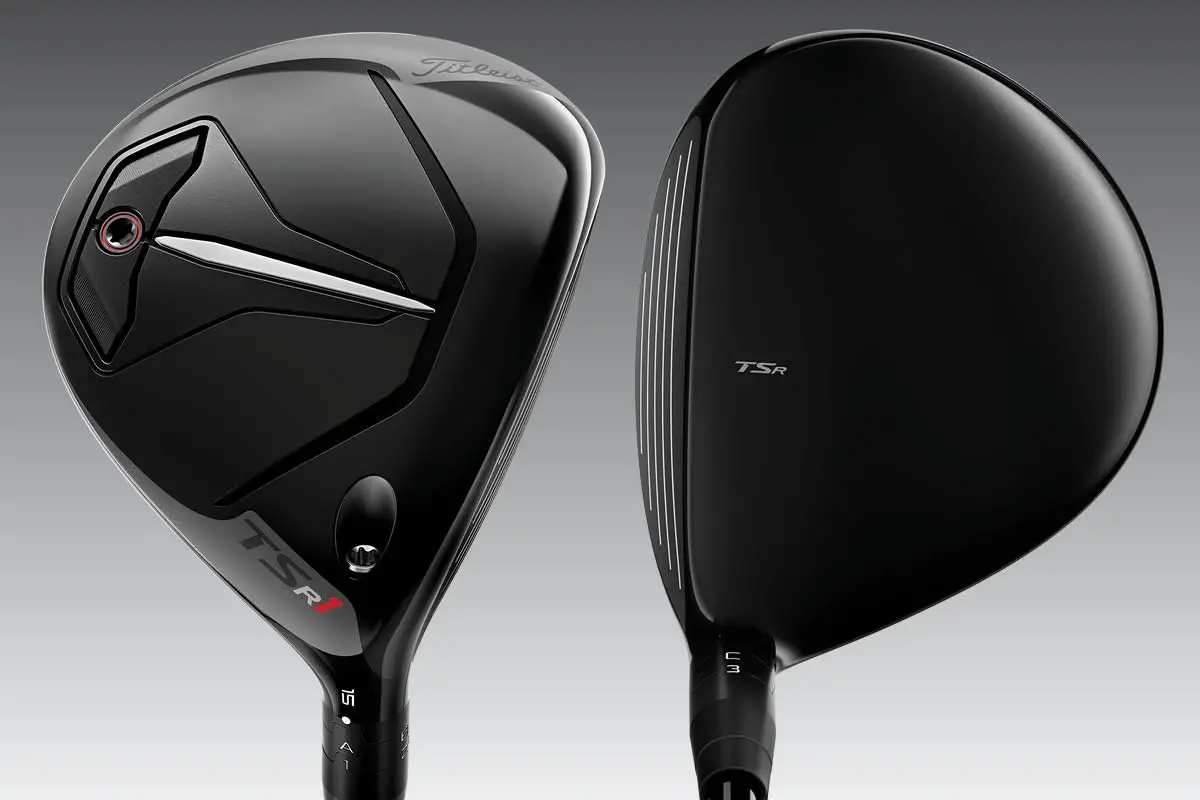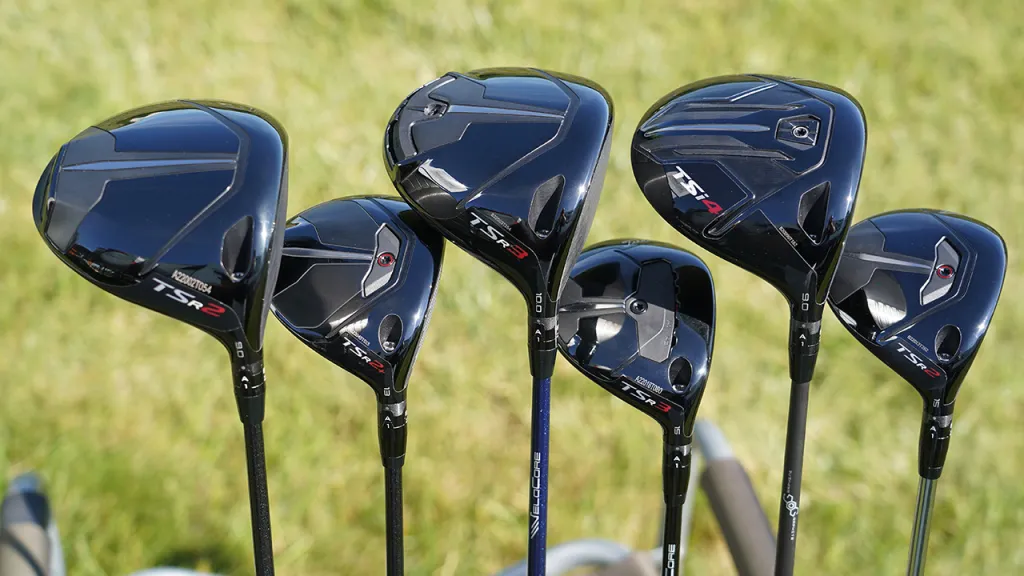CATEGORIES
- Latest News
- Interviews
- Golf Travel
- Features
- Juniors
- Competition
- Events
- Health
- Equipment
- Fashion
- Archive
INFORMATION
CURRENT ISSUE

SUBSCRIPTIONS



Stephanie joined me on a video call from her head office at the Titleist Performance Institute (Oceanside, California).
When Steph’s camera comes on, I immediately note her beaming smile, a slight forehead sweat and an infectious enthusiasm transferring through the screen. I ask what she has been doing and Luttrell excitedly shares that she’s been testing new irons upstairs before racing down to take my call.
It’s safe to say that Stephanie positively loves her job and that’s before I’ve even begun my line of questioning…

You come from a golfing family, is that how your interest in the golf world developed?
My dad taught our entire family the game of golf, including my brother, who is the head golf professional at Harbor Point Golf Club in
Michigan. When I eventually decided that I wanted to engage with the game, it was around the same time that I was becoming a freshman in
high school. Fortunately, I improved very quickly and over the course of four years, I went from shooting 110 for 18 holes to shooting in
the mid to low 70s.
Obviously, there was some natural ability - which was nice that it finally kicked in. Next, I set my sights on being able to play at the collegiate level but never really considered playing professionally. I studied mechanical engineering for four years at the University of Michigan and was happy to play golf there at an intermediate level. I also really enjoyed traveling and being part of a team.
When you enrolled to study mechanical engineering, was the golf industry the career trajectory you
were aiming for?
I had always been gifted in science and mathematics so I started to research what careers there were in golf that leveraged those skills. I
soon discovered that there were engineers who designed golf equipment, balls, clubs, etc. You could say that as an oddly focused
18-year-old, I went to college with the intention of studying engineering and the hopes of getting to do what I've been fortunate enough to
now do for the past 20 years. It’s pretty incredible.
Tell us about new equipment design trends, particularly in women's golf, things like special
developments we are seeing as far as innovation goes.
With respect to Titleist, we believe that the golf club or ball, don’t know your gender. We don't design specific golf products and paint
them differently for women; however, we do research to understand the entire golfing population.
So, when we look at that, it doesn't mean that we're only looking at the avid male golfer. It means that we're looking at the entire spectrum of golfers. And what we find is that, in general, the female spectrum of avid golfers is a little bit lower in terms of their speed. Regarding that point, some of the things that we continue to invest in and innovate in is looking at lightweight configurations.
The team which I lead, is responsible for metal-woods, as in drivers, fairways and hybrids. There are strong industry trends for drivers to have higher launch, lower spin and forward CGs (centres of gravity). Some of those trends contrast with what can work best for the moderate-speed player, and a lot of female players fall into the moderate-speed category. Over the past couple of metal-woods generations, we've continued to invest and expand our lightweight product line that adds higher launch and spin which helps to promote increased carry distance.
New grip configurations and new ultra-lightweight shafts are also now available that help players to swing faster too. At Titleist, we're excited about these advancements. We've been able to provide complete club configurations for drivers, fairways and hybrids that help players maximise their distance and gap appropriately with their iron set too.

What would be one simple piece of advice for any woman wishing to improve their game?
In general, I think women don’t consider themselves good or consistent enough to be fitted properly. We've seen great gains, no matter what
your skill level, with having equipment that's individualised and optimized from an overall loft, and weight and build configuration.
Which athletes do you work closely with and appreciate getting equipment feedback from?
There are several players. We have a great relationship with our tour and our leadership team, so we're able to do early prototype testing.
Justin Thomas and Jordan Spieth have been really great assets to us. In the past, Adam Scott has worked closely with us. Cam Smith has also
been a part of that feedback loop recently too.
One of the parts of our design and development process that's important to us is receiving early performance feedback. We obviously seek to use our staff professionals for this testing as they are the best players in the world. They're the most equipped to consistently hit and strike a product and provide that feedback. And so, with every new generation of Titleist product, it has allowed us to deliver an even better-performing product.
We've also expanded our presence on the LPGA tour in the past few years. Up until January, Nelly Korda has been on staff with us. Nelly has been formative in the past, working with us on the 1 category, which is our ultra-lightweight, most draw, highest launch and highest spin product.
We also have Jessica Korda, So Young Ryu, Danielle Kang, Emily Pedersen, and Pauline Roussin-Bouchard. It’s a great staff and stable of players that has helped us to further evaluate our product performance. When you look at the speeds on the LPGA tour, it's actually more comparable to what average men's speeds are in the marketplace.
I think it's going to be a growing trend. We'll find more and more men interested in watching LPGA players because their game and their distances are actually closer to what the rest of us achieve.
The women on tour show how the game can be approached differently too, right? Nelly's short game, Danielle's ability to stuff a fairway wood in there to five feet. It's pretty amazing.
Why do you think hybrids tend to work better for women?
Well, a lot of it comes down to the fact that the CG placement, face compliance, heavier weight and shorter length of long iron heads do
not generate enough speed and dynamic loft to maximize carry and total distance for female players. Hybrids were originally conceived as a
metalwood product to address those performance issues. They provide a deeper CG, longer, lighter option with a faster face design that
leads to more optimal launch, spin and distance. There is also a category of golf clubs called utility irons that deliver performance
between a hybrid and a traditional long iron.
We're strong proponents of people looking at and evaluating all the gap fitting options. Titleist offers a lot of great options at the top end of the set from utility irons to hybrids, to high-lofted fairway woods. For our upcoming spring launch, we're extending our TSR metal-wood line to include TSR 1 drivers, fairways and hybrids.
Within the TSR1 fairway line, we offer up to a nine-wood (23-degree fairway wood). The TSR1 hybrids extend to a seven-iron replacement (29-degree hybrid). These product offerings are important because we see moderate swing speed players have difficulty maintaining speed at the top end of their iron set to achieve appropriate distance gapping. These products also generate higher launch. Without launch, moderate swing speed players cannot control the ball flight coming into the green and have appropriate stopping power.
There are lots of options. It comes down to being fitted by a professional where you can try different options and compare them to your current set. You’ll be able to see when your distance drops off.
By seeing a fitter and working on a launch monitor, you might be able to determine that you’re not able to maintain, for example, your 8m gaps, 10m or your 12m gaps, depending on what your speed is. From there, you can consider adding clubs like hybrids and high-lofted fairways that help to increase distance and gap appropriately.

Can you share any new Titleist products coming out or is it all a bit top secret?
The TSR hybrids and TSR1 products recently debuted at the PGA Show and last September, we launched the TSR line of drivers and
fairways. At that time, we launched the 2, 3 and 4 driver models as well as the 2, the 3, and the 2+ fairway woods. With the TSR
hybrids, we have a 1, 2 and a 3-hybrid model.
We also offer a TSR1 driver and fairway. The TSR1 products, are tailored towards moderate-speed players. Any player that has a clubhead speed of approx. 90 miles an hour and below should consider these products. They are designed with an ultra-lightweight configuration that helps players to swing faster. They’re also designed to get the ball up in the air, so higher launch with a little more spin, to just maximize their carry. It is a dedicated product towards what we consider a pretty large portion of the market.
There are some changes to the TSR1 fairway and the hybrid in terms of how we build them for overall weight which has yielded increased distance and consistency. With the TSR1 driver, we've improved the aerodynamic shaping and adjusted the centre of gravity position, to drive more distance for players, helping them move through the air faster, achieve optimal launch and spin to maximise their carry in total. We're very excited about those changes!
The 2 and the 3 hybrids build upon our TSi2 and TSi3 designs, but with key shape enhancements and repositioned centre of gravity to make them faster as well. This is helping generate more speed for players to distance gap appropriately.
I like to say the 2 hybrid is more of an all-around playability hybrid for players who are using a hybrid more like a fairway wood. The 3 hybrid is more of a precision product for a player who is more skilled and who can hit a hybrid more like an iron. It also offers left-to-right centre of gravity fitting adjustment.
Ok, you’re totally selling me Stephanie
I'd love your feedback when the TSR1s are available over there, which is soon. One of the things that we did with the hybrid product is
build it with a unique fairway wood type shaft that we co-designed with Mitsubishi, so it allows us to generate more dynamic lofting, higher
launch and ultimately more carry distance.
A lot of moderate-speed players need to generate more launch. The shape of this head lives between a TSR2 hybrid and a fairway wood. It has a larger volume head and more kick, you could say, at the bottom of your swing because of the shaft and build configuration.
The testing we've done has made everyone excited about how the TSR1 could help golfers score better as well as expand our hybrid business.
Do you work with any long-drive athletes?
We don't specifically that I know. I did meet Averee Dovesk recently. She came out to the Titleist Performance Institute recently and we
fit her for a TSR driver. I'm not sure if that's what she's using in her competitions, but I've seen her practice. Long Drive events are fun
to watch.
Speaking of the Titleist Performance Institute, we are currently in the process of a major renovation of the facility and it's going to be incredible. Titleist commissioned David McLay-Kidd to do the redesign. The new layout will provide the upgraded testing capability for our R&D team, industry-leading fitting facilities and tools for golfers to be custom fit, and there'll even be a mini nine-hole course that we can play, which will be fantastic.
I bet you'll never want to go home.
I know. That's a problem. We're like, "Can you put lights on, so we can play at night?"
Words: Roxanne Andrews